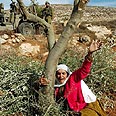
The olive tree represents Palestinians and Israelis alike
צילום: איי פי
End olive harvest attacks
If understanding with PA to be reached, settler rioters at olive groves should be dealt with
"A Palestinian farmer residing in the Tal village adjacent to Kedumim was stoned by settlers from the Gilad outpost while harvesting olives. The man was treated at the site and evacuated to hospital. The Rabbis for Human Rights organization lodged a complaint with the IDF and the Coordination and Liaison Authority."
This laconic report by the French news agency Tuesday is just the opening shot ahead of another season of trouble at West Bank olive groves.
Each year during this season the harsh events carried out by settlers attacking the Palestinian olive harvesters are repeated, and each year security officials repeatedly assure they will do their utmost to prevent such attacks. However, both the Palestinian farmers and the settlers know how "serious" these assurances are.
The olive tree was selected this year as Israel's "national tree." Some 8,800 Ynet surfers voted for it ahead of the Olympics in Beijing next year. However, similar to several other matters, the Olive tree is also the national tree of our Palestinian neighbors-enemies. They didn’t select it in an online competition ahead of the Olympics: Since the 1950s the majority of Palestinians have regarded the olive tree as their national emblem. Being torn from their olive trees is a motif that is repeated in Palestinian literature and poetry in the past 10 years.
Each year skirmishes between Jewish settlers and Palestinian farmers take place adjacent to these trees in the West Bank. The farmers blame the settlers for attempting to steal their "single prized possession" – the olive and oil yield on which the livelihood of tens of thousands of families are dependent throughout the long winter months.
In the eyes of the farmers, these attacks are the continuation of another harsh abuse: During the construction of the separation fence in recent years, construction contractors uprooted thousands of olive trees, the vast majority of which were sold to Israeli nurseries.
The attack on harvesters, the damage to the olive groves and the uprooting of trees are perceived by the Palestinian public as an attempt to uproot them from their land. Moreover, the security forces are exhibiting an unfathomable helplessness wherever protecting the Palestinian farmers and in warding off settler aggression is concerned.
The incumbent government is seeking to reach understandings with the Palestinian Authority regarding the West Bank and Jerusalem. The prime minister is seeking to strengthen the heads of the Authority so that the Hamas takeover of Gaza will not be repeated in the West Bank.
Yet while secret understandings are being reached at the covert meetings between Olmert and Abbas, life goes on as usual at the West Bank olive groves.
It is worth noting that this year very low yields are expected (last year there was an abundance of olives, and this year the opposite is expected due to the trees' biennial cycle), and each yield harvested is rare and its price set accordingly.
If this year the security establishment does not show some determination in its handling of the attacks, cabinet representatives will find it difficult to convince Palestinians that their intentions are indeed serious in more critical matters such as establishing a Palestinian state, transfer of land and reaching an agreement on Jerusalem.
Despite the matter being seemingly marginal, perhaps our cabinet leaders should remember that which is written in the bible: A good name is better than precious oil.










